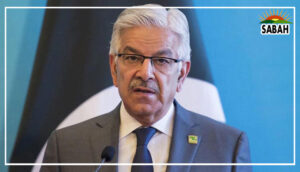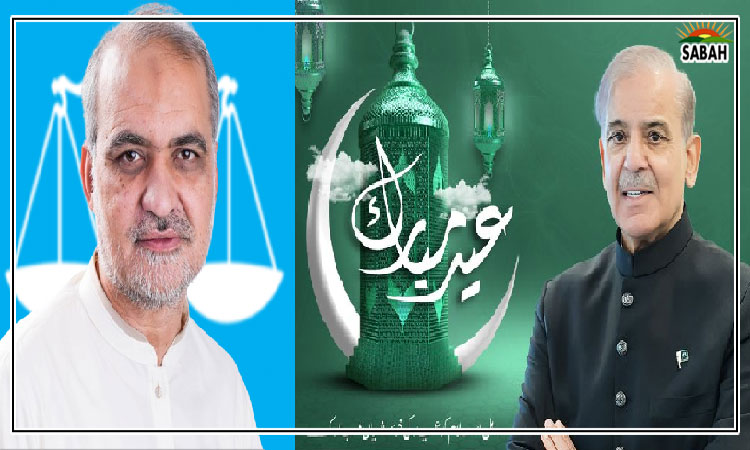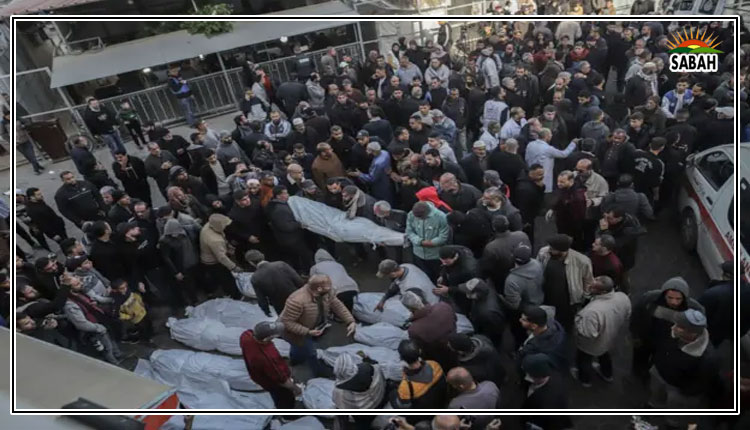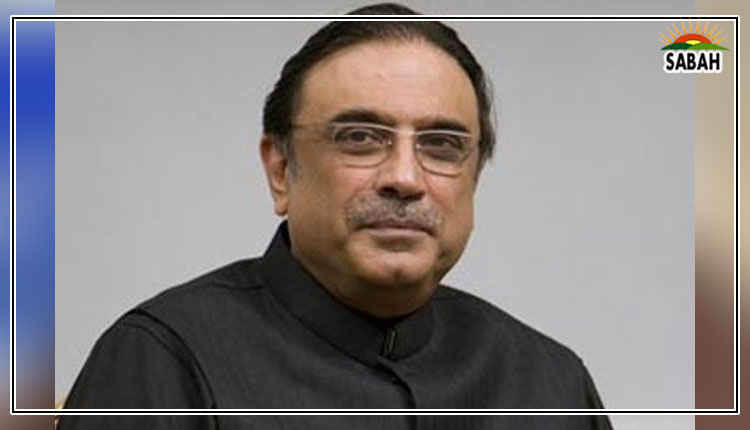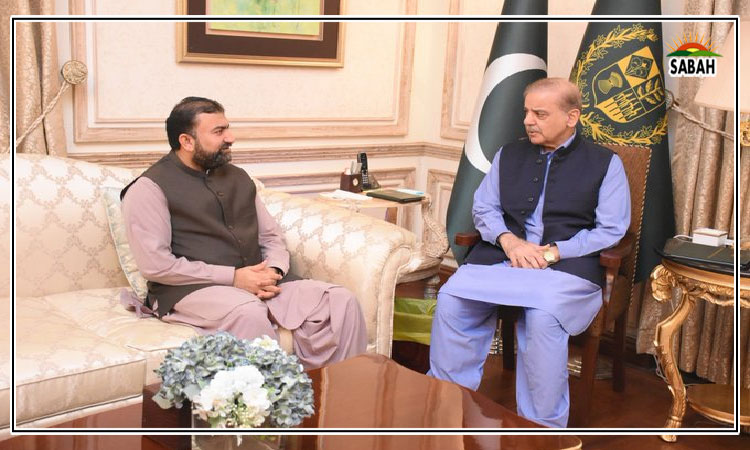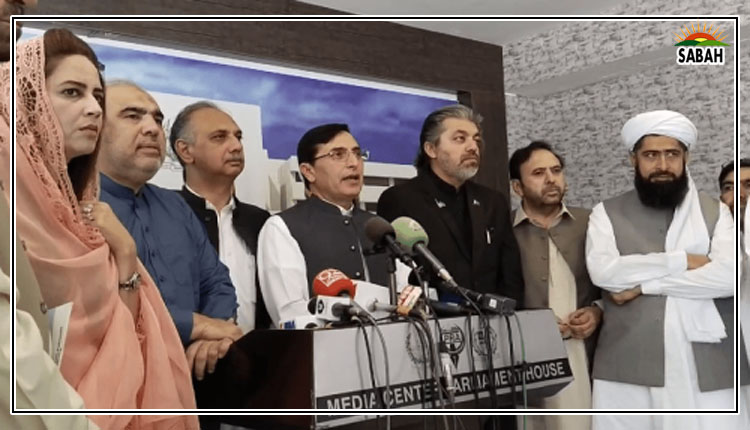Parliament be taken into confidence before any offensive against militancy was launched: PTI
ISLAMABAD, June 23 (SABAH): A day after the government announced a new counterterrorism operation called ‘Azm-i-Istehkam’, the Pakistan Tehreek-e-Insaf (PTI) on Sunday demanded that the Parliament be taken into confidence before any offensive against militancy was launched.
The government on Saturday announced the operation, vowing to unleash the full force of the country’s military, diplomatic, legislative, and socio-economic arsenal to decisively defeat terrorism and extremism.
The announcement came after a meeting of the Central Apex Committee of National Action Plan, which was chaired by Prime Minister Shehbaz Sharif and attended by key federal ministers, provincial chief ministers, services chiefs and top bureaucrats.
“The prime minister approved a reinvigorated and re-energised national counterterrorism campaign through the launching of Operation Azm-i-Istehkam, with the consensus of all stakeholders including the provinces, Gilgit-Baltistan and Azad Jammu and Kashmir, symbolising the national resolve to eradicate extremism and terrorism from the country,” the Prime Minister’s Office said in a statement issued after the meeting.
Azm-i-Istehkam is the latest in a series of counterterrorism operations launched by the Pakistan Army since the mid-2000s. More recent operations include Zarb-i-Azb, launched in 2014 by Gen Raheel Sharif to combat militants in North Waziristan, and Raddul Fasaad, initiated in 2017 under Gen Qamar Javed Bajwa to eliminate what was then described as “residual terrorist threats” in the country.
While these operations achieved tactical successes, including the reduction of terrorist incidents and the elimination of high-value targets, they did not completely eradicate militancy from the country.
The decision also came right after a high-ranking Chinese official on Friday singled out security as the foremost challenge threatening the future of the China-Pakistan Economic Corridor (CPEC).
“Security threats are the main hazards to CPEC cooperation. As people often say, confidence is more precious than gold. In the case of Pakistan, the primary factor shaking the confidence of Chinese investors is the security situation,” Liu Jianchao had emphasised.
Speaking to the media outside Parliament House in Islamabad on Sunday PTI Chairman Barrister Gohar Ali Khan said, “It is our demand […] that if there is any operation — whether intelligence-based or full-fledged or in certain districts or villages or tehsils — it is necessary to take this Parliament into confidence.”
He made the remarks while the National Assembly was in session, saying that the opposition wanted to speak on a point of order that the “military leadership, as done in the past, give an in-camera briefing and detail the situation”.
However, he alleged, that lawmakers from his party were denied the chance to speak and therefore staged a walkout in protest.
He asserted that no matter how empowered a committee was, it could not supersede Parliament and that there were “rules” according to which the apex committee should approve the plans for ‘Operation Azm-i-Istehkam’.
Standing beside him, former NA speaker Asad Qaiser demanded the same: “I simply demand that if any decision has been taken [to launch an operation], then it be brought before Parliament and Parliament be taken into confidence.”
Opposition Leader in the National Assembly Omar Ayub Khan said they had wanted to speak during Sunday’s NA session but were not allowed to.
Demanding “due share and due right”, Omar Ayub alleged that NA Speaker Sardar Ayaz Sadiq’s “attitude” towards the opposition was “not right”.
Earlier in the day, Asad Qaiser met Jamiat Ulema-i-Islam-Fazl (JUI-F) Chief Maulana Fazlur Rehman. PTI central deputy information secretary Akhunzada Husain was also present during the meeting.
In a post on X, Asad Qaiser said, “Our belief is that a military operation is not the solution to the issue. All political parties must play their role to establish peace in the province.”
According to a statement issued by the PTI, both leaders discussed the country’s political situation and expressed their concern at the law and order situation countrywide, especially in Khyber Pakhtunkhwa.
It added that the two agreed that their parties would play the role of a “strong opposition” in the NA.
The PTI statement also quoted both parties as rejecting the proposed federal budget for the upcoming fiscal year as an “IMF budget” and “anti-people”.
They also agreed to fulfil their role in maintaining brotherly ties with Afghanistan, expressing their wish for “good and exemplary relations” between the neighbours.
The statement quoted them as demanding the establishment of an economic corridor at the Afghanistan crossing point, emphasising that trade activity would bring economic stability and employment opportunities to the region.
During the meeting, the PTI and the JUI-F also decided to form a combined political committee to sort out reservations and decide the future action plan.
Asad Qaiser and Maulana Fazlur Rehman agreed to collaborate as a strong opposition in the National Assembly. They also emphasised the importance of maintaining good relations with Afghanistan, highlighting the need for exemplary ties with the neighbouring country.
The leaders proposed the establishment of economic corridors at crossing points with Afghanistan. They argued that enhanced trade activities would bring economic stability to the region and create employment opportunities. Additionally, both parties rejected the current budget, labeling it as IMF-driven and anti-public.


